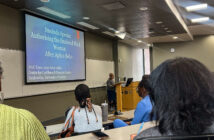Kevin Cassidy, the International Labour Organization’s senior communications and external relations officer for the United Nations, gave a lecture entitled “The Future of Work: Sustainable Enterprises & Decent Work for Inclusive Development” in Rauch Business School Oct. 16.
The primary focus of his lecture was the global problems emerging due to lack of decent, quality jobs. He identified political unrest, social inequality, poverty and lack of educational opportunities as results of unemployment.
“Is it better for the economy and for social cohesion to have 10 people making 20 million dollars or 2,000 people making 100,000 dollars?” Cassidy asked the audience at the beginning of his presentation.
He then continued with the lecture, saying he would return to the question at the end.
The ILO’s goal is to address unemployment and the surrounding problems by promoting the international standard regime, employment promotion, social dialogue and social protection.
Cassidy said research has shown that decent work can transform nations.
“We just had a report, the World of Work report, that came out in April of this year, (which) says that countries that have invested in creating quality jobs have sustained growth and have weathered the economic and financial crisis,” he said. “So, to give you some numbers, countries that invested in quality jobs in the early 2000s grew nearly one percent faster every year since 2007 than other developing countries.”
The measures that the ILO suggests, such as social protection, are effective.
“Unfortunately what happens is that it’s seen as a cost; it’s not seen as an investment,” Cassidy said.
Security is an extremely important, yet somehow unexpected, factor that he said is strongly connected to economic growth.
“If people are starving, people will boil over—they’ll want to do something,” Cassidy said. “So, one of the big issues that we now see at the UN, and I’ve heard this in all of the speeches that they have to say, is security issues. One thing that they have in Nepal right now is that all the young people who are not working are becoming very frustrated, and they’re looking for something to give them justification for that frustration.
“This unfortunately spills over into a political fight, or even into military conflicts,” he said. “Now the number of those will grow.”
Cassidy also discussed the ILO’s efforts to empower women as workers in the economy. He said the ILO emphasizes teaching skills, such as how to be entrepreneurs, set up bank accounts, fill out applications for loans and do market analysis “We know from our analysis that when women are actually earning money, more money goes into the household and is invested wisely,” he said.
This sometimes proves challenging, however, in countries where it is not culturally acceptable for women to work. Because this aspect of female empowerment is culturally sensitive, he said that the organization is attempting this change gradually and working within that context.
For instance, he mentioned Education for Employment, an organization in the Middle East that trains young women to become electricians. Women tend to be alone in households during the day because men leave for work, and only females can visit the house while men are away. So, women are then enabled to become electricians, as they can work during the day and it does not violate any cultural norms within their society.
“I enjoyed his discussion about women’s empowerment in developing countries, which brought to light the limitations women can have in the working world due to a nation’s culture,” said Alexandra Stephanou, ’15. “I was unaware of all the work the ILO does to combat this problem.”
During the question-and-answer session, Jose Alejandro Sierra, ’16, asked what the answer was to the initial question at the beginning of the lecture. Cassidy explained that it is better for the economy to have many decently paid workers than a few excessively paid ones because the latter group’s excess money would typically be invested in ways that do not affect the real economy.
“So, the greater the money that goes into the economy, and people with less money spend more in the economy on everyday activities, it creates greater velocity in the economy, as well,” Cassidy said.
Sierra said the the topic he related with the most was entrepreneurship in developing countries.
“Cassidy talked about how entrepreneurs abound in developing economies, but most of the times fail to succeed in their businesses due to a lack of market research and analysis; that is, sellers trying to sell a product or service that buyers are not looking for,” Sierra said. “I grew up and live in Panama, a developing country, and I have known of entrepreneurs that have failed to succeed in their businesses because they venture into an activity without knowing the market they are getting into and without understanding basic principles of economics that may have helped them succeed. I know that developing countries are investing a lot in education and research in STEM fields, but I think it’s also time to invest in economic research and start understanding basics of economics.”
The lecture attracted students and faculty from a wide variety of disciplines and was organized by the College of Business and Economics Global Initiatives, the Rauch Center for Business Communications, the International Business Club and the LU/UN Partnership.
“I was happy to see that over 40 students were in attendance,” Stephanou said.





Comment policy
Comments posted to The Brown and White website are reviewed by a moderator before being approved. Incendiary speech or harassing language, including comments targeted at individuals, may be deemed unacceptable and not published. Spam and other soliciting will also be declined.
The Brown and White also reserves the right to not publish entirely anonymous comments.